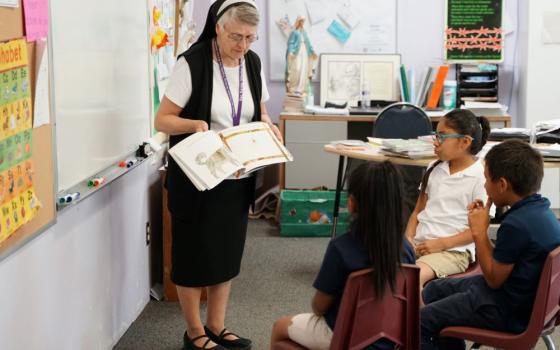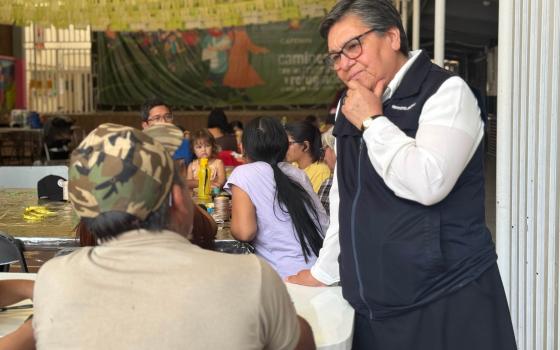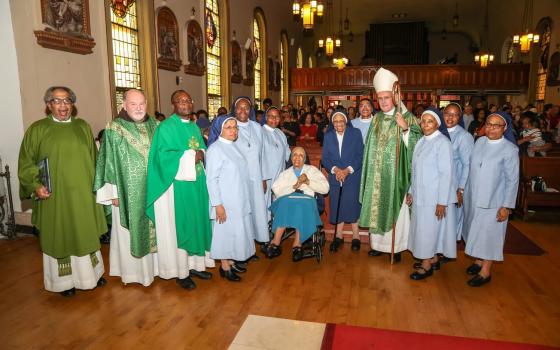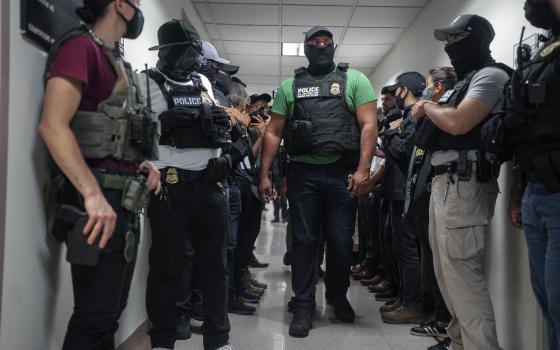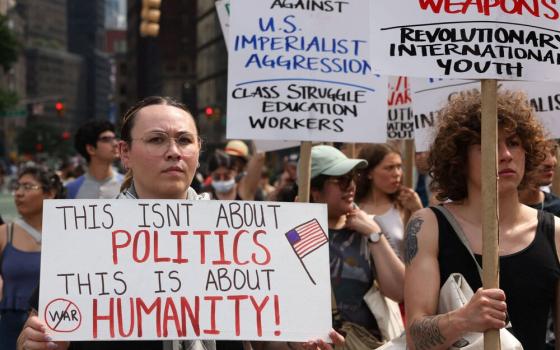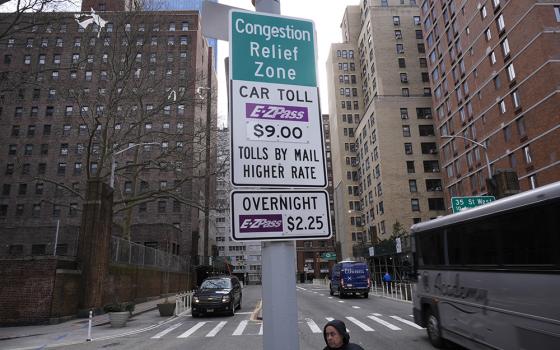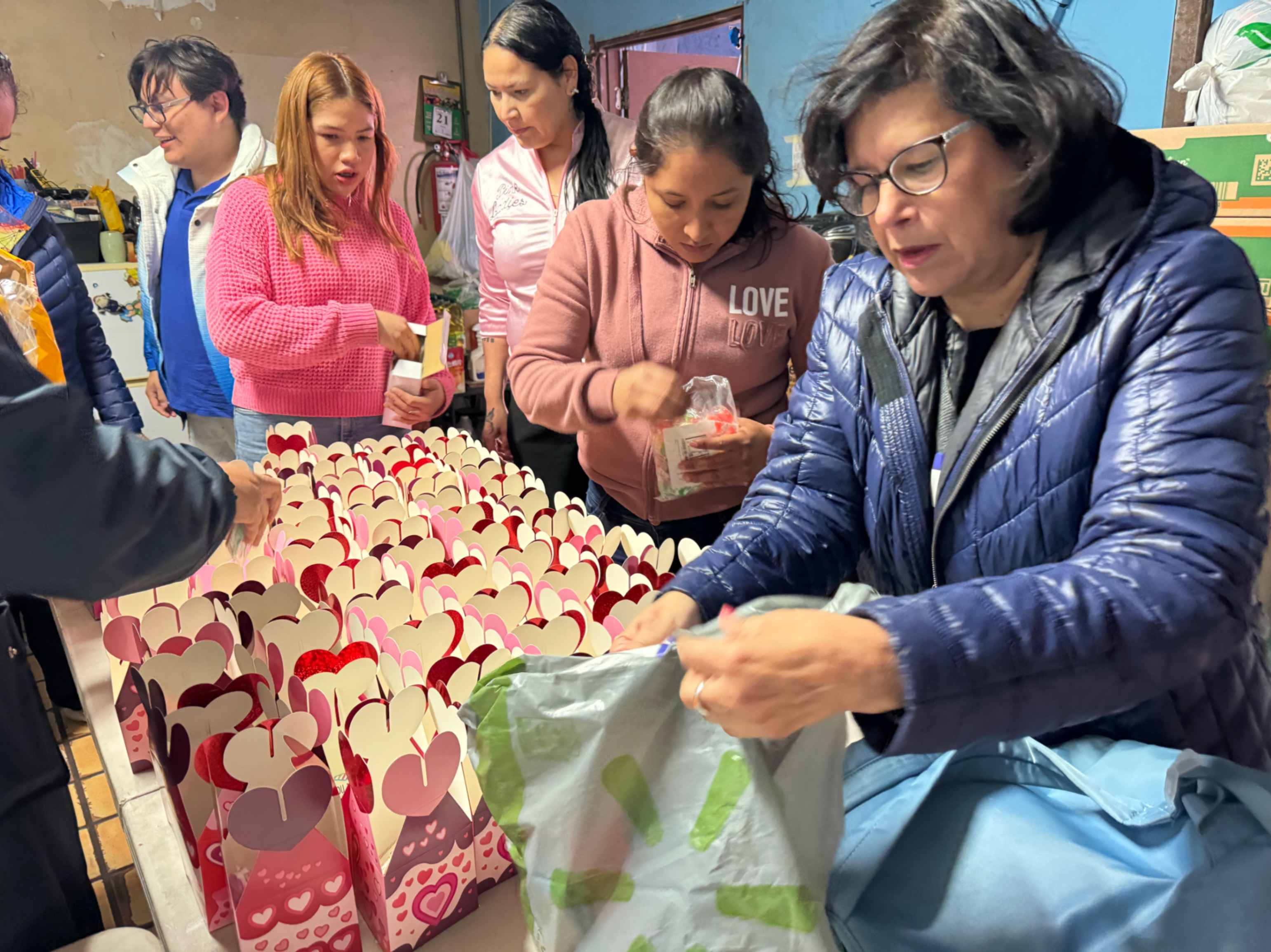
Social Service Sr. Elizabeth Lopez, right, packs candy and other treats for those at the Cobina Posada del Migrante shelter in Mexicali, Mexico, Feb. 8. Lopez, an immigration attorney, tries to inform asylum-seekers of what the U.S. asks for when granting asylum. (GSR photo/Rhina Guidos)
Editor's note: Global Sisters Report's new series, "Welcoming the Stranger," takes a closer look at women religious working with immigrants and migrants. While we cover this topic often, this series will feature sisters and organizations networking to better serve those crossing borders, global migration trends and the topic of immigration in the upcoming U.S. presidential election.
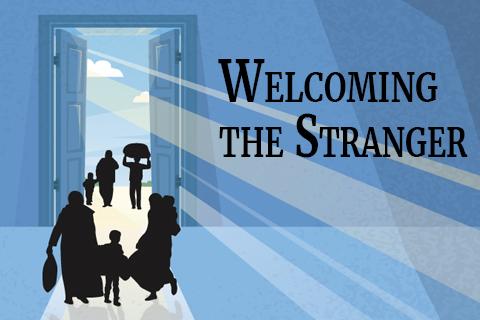
Social Service Sr. Elizabeth Lopez is as comfortable serving a bowl of soup to migrants on one side of the border as she is fighting for them in immigration court on the other.
"Day in and day out, I hear the stories of my clients who have come here and what they've risked and what they've left behind at home," said Lopez about what pushes her to help newcomers as an immigration attorney in the San Diego area.
Even as immigration increasingly becomes a political hot potato leading up to the U.S. presidential election in November, Lopez, founder and executive director of the Southern California Immigration Project, remains committed to helping asylum seekers. Whether feeding people or informing them about what constitutes asylum and what they need to help bolster their case in immigration court, Lopez draws on the long and rich history of Social Service Sisters in her mission to help.
Margaret Slachta, the congregation's founder, was an ardent fighter against antisemitism in Hungary in the 1940s and was known for her public defense of Jewish people, denouncing laws against them, helping them evade deportation in some cases, feeding and sheltering them in convents.
The history of the order's origins, coupled with a family upbringing committed to social justice, has led Lopez, through the years, on a path to provide information to help asylum seekers make their cases before U.S. immigration judges.
She frequents shelters and other centers where migrants gather to offer "know-your-rights" programs.
'Day after day I hear my clients' stories: what they have risked and what they have left behind.'
—Sr. Elizabeth López
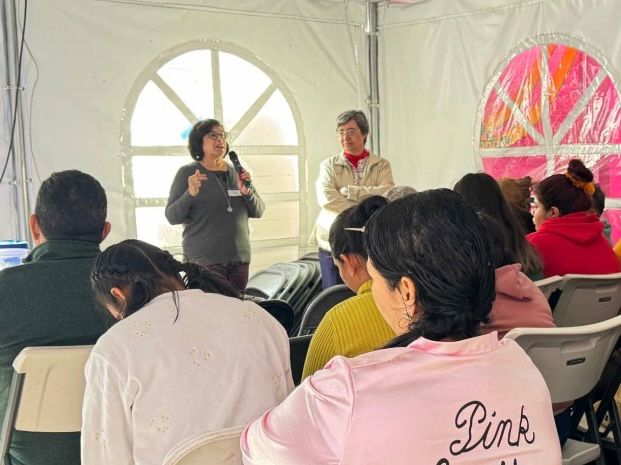
Social Service Sr. Elizabeth Lopez, left, talks to a group of migrants at the Cobina Posada del Migrante shelter in Mexicali, Mexico, Feb. 8. Lopez, an immigration attorney, tries to inform asylum-seekers of what the U.S. asks for when granting asylum. (GSR photo/Rhina Guidos)
"I screen people one-on-one and let them know what evidence they're going to need so that as they're sitting there in the shelter, maybe they can already try to gather that evidence, having it be sent to them or to a family member in the United States so that they can be better equipped to face their credible fear interview or hopefully an asylum case in the future," she said. "I just always want people to be the best informed that they can be when they're already in a difficult and very convoluted system."
As political parties vie for the chance to tell voters how they will deter people from entering the U.S., Lopez remains focused on helping them navigate legal channels. She recently spent time with other women religious at the U.S. southern border, pondering the suffering of migrants, talking to a group waiting to board a bus after crossing and visiting a desolate spot in the desert south of San Diego, where migrants had sought shelter, and a cemetery where those who died on the journey, and whose identity is unknown, are buried.
"It brings it more into my reality, knowing what my clients have gone through and just thinking they could have walked here or they could have ended up in that cemetery. It's very sobering and profoundly impacted me," she said.
GSR: Tell me a little bit about how being an attorney fits into your vocation.
Lopez: Well, our community's mission and charism is dealing with the most vulnerable: those on the margins. Particularly, we were begun with focusing on women and children, but of course, it really encompasses everyone. Our foundress was the first woman elected to parliament in Hungary. And so, we also come with the charism of doing systemic change and going to the source and solving problems. I think it fits very well with our charism and mission.
What is it that you loved about your foundress?
Just that. I've always had a very solid social justice background from the day I was born. My parents are very social justice-oriented, and so it was something very much ingrained in me and helping those less fortunate, those on their margins, those that don't have a voice.
Did you meet a particular sister, or how did you become acquainted with the order?
I grew up in Orange County [California], and at the church I was at, St. Joachim's in Costa Mesa, [California], one of the seminarians there knew one of our sisters. … she had taught at the seminary, and he really liked her, and he knew me pretty well. So, he said, "Hey, she's great. I think you should check out this order. And they're very social justice-focused." So, due to that, I spent time with the sisters. And the more I got to know them, it felt like home. It was a good fit for me because they were also social justice-oriented.
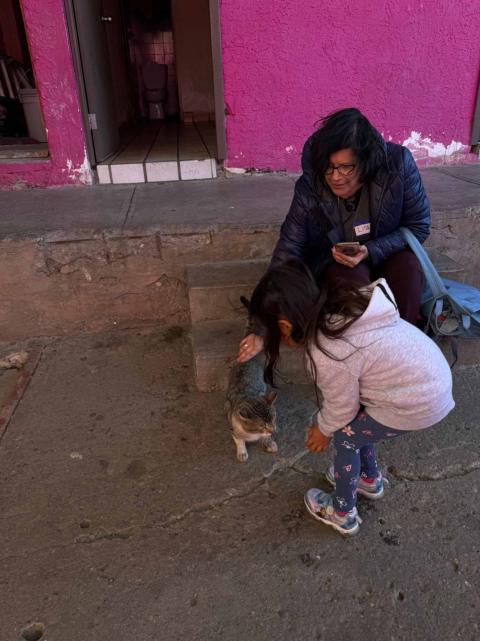
Social Service Sr. Elizabeth Lopez talks to a little girl while petting a cat at the Cobina Posada del Migrante shelter in Mexicali, Mexico, Feb. 8. Lopez, an immigration attorney, said her family’s commitment to social justice took her on a path to join the Social Service Sister focused on systemic change. (GSR photo/Rhina Guidos)
Tell me about some of the challenges of your profession these days because we're talking about immigration, a very polemic issue, even inside the church. What are some of the challenges that you face?
Well, the challenges I face is with our government administration. When I first became an immigration attorney, it was under [President Barack] Obama, and things were very different. It was more of a welcoming feeling in our country. And since then, things have very much devolved. And it's under the prior administration, it was really like being in a war zone for all of us immigration attorneys. It was horrible because every week there would be more rights that were stripped away from our clients. There was less case law to be able to fight with, less rules and regulations that we had grown accustomed to that were just falling apart all around us. It gave everyone in the immigration process just this sense of hopelessness. That was really hard.
Have you been able to rebuild any of that hope under this administration? There was a promise of a greater number of asylees allowed in, even though that number hasn't come to fruition. Are there things that ended up working better after that period?
Well, the best thing is we did get just a better attorney general who went back and took back a lot of the laws that had protected immigrants and reversed them from what Attorney General [Jeff] Sessions had done. So, that was a hopeful thing, and that happened pretty much within the first year of the Biden administration. Beyond that, there hasn't been a lot of change. And in the last year, we've seen it get just as bad, if not worse than what it was under Trump's administration. So, it's been very frustrating and disappointing to us.
And what are your worries going into this election season?
The way Congress is talking. And if Trump should get reelected, he will take away asylum in totality and probably close the border again.
Advertisement
Tell me about your clients. Are they mostly asylum seekers? Who's the bulk of your clientele?
We only do asylum and everything that comes with that: work permits, TPS, temporary protective status if our clients are eligible for that. But 95% of our cases are asylum, and our clients are from Africa or LGBT members from any country.
Tell me about the LGBTQ members. What are some of the special considerations? Some people will say, "Why are they a vulnerable population?"
In any country that they're coming from, they're targeted. Now, Mexico has gotten better in their treatment of LGBTQ, but trans are still a very much high-risk group in that country. In the African continent, most of the countries are Muslim. To them, there is nothing viewed more as an abomination than to be LGBT.
Do they face any special dangers in detention, in immigration detention or even in the immigration journey itself?
Yes, they do. Again, they will be targeted by the other people that are on the journey with them because of their sexual orientation. In detention, (I've been doing this for 15 years) the U.S. has tried to do a segregated [detention] where they'll have certain detention facilities that will house a special wing just for LGBTQ for their own safety, but that didn't happen nationwide and even failed in California when we were trying to support that. So, now they're put into the general population. And yes, things are not good, especially with the trans clients. They may have need for wearing a bra or other types of hormone therapy, things like that, and that isn't given to them many times, especially undergarments that they need that they will not give to them because they're in the general population.
There's probably a group of Catholics who would say: “Why do sisters help somebody who is LGBT?" Does it go against the teachings of the church? What would you say to them?
I would say that God creates all of creation, and God is love and that no matter what your sexual orientation is, God created you, and God loves you equally.
[This story was originally published in Spanish on June 27, 2024.]

